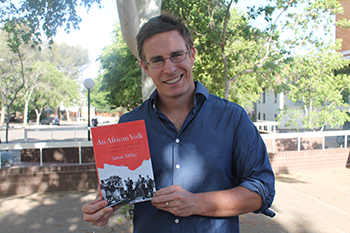Latest News Archive
Please select Category, Year, and then Month to display items
05 April 2021
|
Story Dr Nitha Ramnath
|
Photo Supplied
 Jamba Isaac Ulengo.
Jamba Isaac Ulengo.
François van Schalkwyk and Keenan Carelse, UFS alumni leading the university’s United Kingdom Alumni Chapter, have put their voices together to produce and direct the podcast series. Intended to reconnect alumni with the university
and their university experience, the podcasts will be featured on the first Monday of every month, ending in November 2021. Our featured alumni share and reflect on their experiences at the UFS, how it has shaped their lives, and relate
why their ongoing association with the UFS is still relevant and important. The podcasts are authentic conversations – they provide an opportunity for the university to understand and learn about the experiences of its alumni and to celebrate
the diversity and touchpoints that unite them.
Our podcast guest
Born in the North West town of Vryburg, Ulengo first played provincial rugby at the U16 Grant Khomo Week in 2005. While attending Jim Fouché High School in Bloemfontein, Ulengo was chosen to represent the Free State at various youth levels. As
an up-and-coming player, Ulengo made his break via the FNB Varsity Cup Competition where he starred for the Shimlas, scoring 11 tries in 18 appearances over the three seasons between 2010 and 2012. A short stint with the Free State Vodacom Cup side
saw him make his debut for the Blitzboks (Glasgow 2012), followed by a tournament at the London Sevens in 2014. Ulengo has been a prominent member of the South African Sevens since making his debut for the team in the Scotland leg of the 2011-2012
IRB Sevens World Series. He played in the two final tournaments of that season and then signed a two-year contract with the South African Rugby Union to represent the team in the 2012-2013 and 2013-2014 series. While he only competed at four events
in his first full season, he was involved in seven of the tournaments in his second season.
Ulengo made his return to the sport by signing a contract to play Currie Cup rugby for the Pretoria-based Blue Bulls in 2014 and for their Super Rugby franchise, the Bulls, from the 2015 Super Rugby season.
US author launches book at UFS on African volk
2016-10-17

Dr Jamie Miller, Postdoctoral Fellow at the
University of Pittsburgh and author of
An African Volk: The Apartheid Regime
and Its Search for Survival.
Photo: Rulanzen Martin
“I realised the importance of not just accessing the policies and political approaches of the leaders of the apartheid regime, but understanding the ideas and world views that informed them. Part of the solution to this was to learn Afrikaans.”
This is according to Dr Jamie Miller, a Postdoctoral Fellow at the University of Pittsburgh, on how he went about getting inside the mind of South Africa’s apartheid regime in order to complete his book, An African Volk: The Apartheid Regime and Its Search for Survival.
The book was launched on 11 October 2016 by the Archive for Contemporary Affairs at the University of the Free State on the Bloemfontein Campus.
Volk refers to the Afrikaner nationalist movement
The book is an ambitious new international history of 1970s apartheid South Africa. It is based on newly declassified documents and oral histories, the majority in Afrikaans, which focus on the regime’s attempts to turn the new political climate to its advantage.
The term volk refers to the Afrikaner nationalist movement, also known as Afrikanerdom. The story of Afrikaner nationalism was the medium through which the regime gained power.
Four main messages from the book
Dr Miller says there are four main messages for his readers. Firstly, the apartheid regime looked to contest and hijack new ideas and norms that formed the postcolonial world, and secondly, that we need to start thinking more seriously about the Cold War in terms of domestic politics, not just geopolitics.
Thirdly, South Africa should be integrated into histories of the global South, and lastly, we should conceptualise the apartheid regime by looking at it not just as an imperial holdover, but also by looking at what was happening in the world in the time period in question.